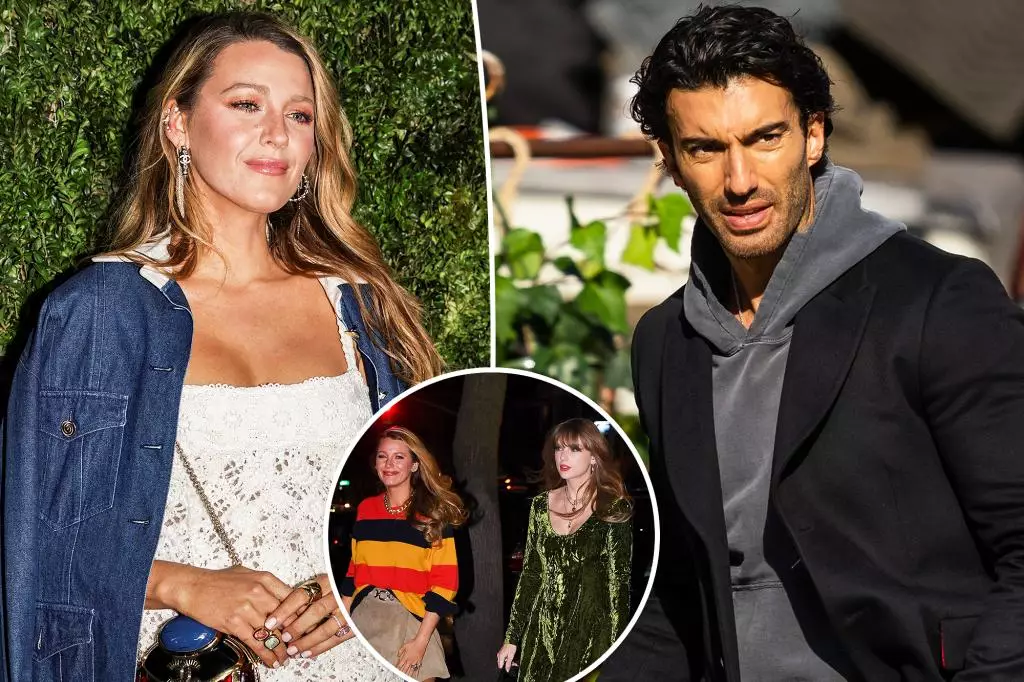The legal battle between actress Blake Lively and director Justin Baldoni has attracted significant media attention, particularly as it involves the internationally beloved pop star, Taylor Swift. At the heart of the conflict is Lively’s motion seeking a protective order—essentially an intervention to safeguard her private communications from being used against her in this tumultuous legal affair. Lively’s assertion that Baldoni’s pursuit of her text messages with Swift is a deliberate tactic to manipulate public sentiment speaks volumes about the intertwining of celebrity culture, legal battles, and public relations theatrics.
It is imperative to recognize the stakes in this clash. By filing these documents, Lively is not only protecting her privacy but also standing up against what she deems an invasive and exploitative strategy employed by Baldoni’s camp. It is an act of defiance against the ease with which celebrity relationships can be weaponized in legal disputes. The request for a protective order, therefore, highlights a larger issue—the rights of public figures in selecting which facets of their personal lives should be exposed to a prying public and which ones must remain confidential, despite the pressures of a relentless media landscape.
Manipulation and Media Strategy
Lively claims that her communication with Swift is irrelevant to the claims being made by Baldoni and his Wayfarer production company. This statement points toward a disturbing trend where personal relationships of celebrities are transformed into tools for strategic advantage in legal disputes. As Lively noted, Baldoni’s repeated invocation of Swift’s name in a media strategy reflects a premeditated plan on his part to leverage Swift’s massive fanbase—not only for public kinship but as a means of bolstering his own case.
This manipulation underscores a larger narrative within Hollywood and beyond—where personal relationships are increasingly becoming fodder for public discourse and legal maneuvering. The idea that one’s friendship could be pulled into the chaos of litigation raises ethical questions about the responsibilities of public figures. Should they be held accountable for relationships in personal and professional spheres that may have no direct bearing on legal entanglements?
The Legal Landscape
Lively’s fight has also revealed significant vulnerabilities in Baldoni’s legal position. Following the dismissal of Baldoni’s countersuit against Lively and her husband, Ryan Reynolds, a message was sent—not only to Baldoni but to all who dare to mobilize personal relationships in legal battles. The judge’s decision to dismiss the libel lawsuit against the New York Times further illustrates the precariousness of Baldoni’s arguments. It signifies a shift in how legal systems might look upon attempts to intertwine private lives with public grievances, especially when manipulative tactics are involved.
If Baldoni’s legal maneuvers were intended to consolidate power in a narrative swinging in his favor, they have instead exposed him to further scrutiny. The fragile ground upon which his accusations and demands stood culminated in a stinging rebuke from the court. This case serves as a cautionary tale for public figures, especially in an age where the lines between personal actions and public perceptions are increasingly blurred.
The Role of Third Parties
As the case progresses, it becomes increasingly evident that friends and associates of the parties involved, such as Taylor Swift, are not mere bystanders but rather critical players in the drama. This situation raises ethical dilemmas not only about the rights of those drawn into disputes but about the roles that publicists and legal teams play in orchestrating media strategies that can affect the lives of third parties. Lively’s team has demonstrated a commendable solidarity with Swift, emphasizing the importance of standing up for the unjust treatment of others, highlighting the human cost of legal battles driven by ambition and revenge.
Furthermore, the role of public perception cannot be ignored, as public opinion often influences the trajectory of legal cases involving high-profile figures. The social media landscape is a breeding ground for conversations, speculations, and opinions that can either bolster or dismantle reputations. The public’s fascination with celebrity culture often morphs into a tendency to vilify or idolize, making the stakes in legal disputes exceptionally high for all involved.
This ongoing battle is not merely about the protection of private messages; it encapsulates the nuances of modern celebrity life, the mechanisms of media power, and the sobering realities of legal entanglements. Lively’s unwavering position against the exploitation of her personal life—and that of her friends—paints her as not just a figure in a legal confrontation, but a symbol of resistance against the commodification of personal experiences in the public arena.

